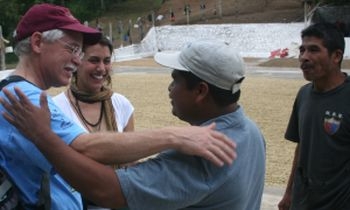 (Stoddard) Green Mountain Coffee Roasters began in 1981
(Stoddard) Green Mountain Coffee Roasters began in 1981
as a small café in Waitsfield. Now it’s the largest Vermont based
business. With annual revenues reaching nearly $4 billion and 5 % of its
pre-tax profit granted mainly to coffee farmers, Green Mountain’s
impact on coffee growing communities and influence on the industry as a
whole is significant. Overseeing this work, is Rick Peyser, Director of
Social Advocacy and Supply Chain Community Outreach. To assess the needs
of the coffee farmers, he began talking to them individually. One
farmer’s reply to a question about hunger touched him deeply.
(Peyser)
The woman just paused and tears started to well up in her eyes. When
she finally composed herself, she told me she and her family had 3 to 4
months of extreme scarcity of food every year and these are months that
come after the harvest when basically the money from the harvest has
been depleted… and when basic staples go up in price. Every single
family… gave me the exact same answer.
(Stoddard) With the
help of a research firm, Rick found that 67% of coffee farmers
experienced extreme scarcity over three to eight months each year, a
situation not acknowledged by the coffee industry.
(Peyser)
People were as shocked as I was about these months. It was… virtually
unknown and unspoken of within the coffee industry yet extremely common
in these communities. I felt a responsibility to generate awareness
within the industry and felt that would be our best audience.
(Peyser)
So we went back to the communities where we interviewed and we shared
the results and we also brainstormed with them. They provided all kinds
of suggestions that they prioritized. 
(Stoddard) Diversification
jumped out as a strategy to try. Teaching farmers how to grow and
market more than one crop was the core of Green Mountain ‘s first food
security project. Results have been impressive.
(Peyser) From
this first project …(this is now) that started in 2008 that assisted
approximately 250 families, we have developed a portfolio that is now
supporting over 50,000 families, close to 300,000 individuals focused
only on food security
(Peyser) Unless we can provide a better quality of life in these rural areas, I believe that the coffee industry is threatened.
(Stoddard)
Rick, who has served on multinational NGOs and formed a non profit for
coffee farmers, is now mobilizing competing coffee companies to work
together for greater impact.
(Peyser) We’re now at the point
where there are 5 companies that have agreed to fund a food security
project together in northern Nicaragua. So in a marketplace of
competitors, for the first time ever, aside from disaster relief, these
companies have come together (to deal with a problem that they feel is
critical to their supply chain). My hope is that other companies will
soon join this effort (and it will expand).
(Stoddard) As Rick
learned here in Vermont , grassroots people coming up with their own
solutions, is a powerful strategy for positive change anywhere. And
businesses can leverage their influence and partner to make the world a
better place. For more on Rick’s story, pick up his book called Brewing
Change. For VPR, this is Fran Stoddard.